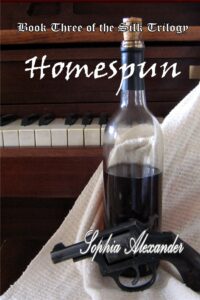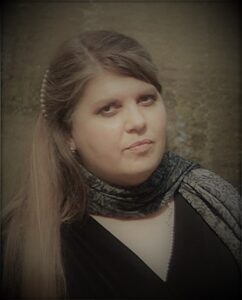Launch: Sophia Alexander’s Homespun: Book 3 of The Silk Trilogy
INTERVIEW BY LESLIE S. LOWE
Sophia Alexander is the mother of two young adults and a number of manuscripts. A graduate of the College of Charleston, she earned her doctorate in naturopathic medicine from Bastyr University—so characters are often swallowing decoctions or slathering on herbal salves. The Silk Trilogy is her award-winning debut work.
What is your ‘elevator pitch’ for Homespun?
Trouble lurks in the Lowcountry of South Carolina in the guise of a family feud, forbidden love, and a journalist hell-bent on uncovering corruption. Accompany the third generation of Caroline’s family through this conclusion to The Silk Trilogy.
 What inspired you to start writing and what has been the most rewarding about it?
What inspired you to start writing and what has been the most rewarding about it?
A fortune-teller may have had something to do with it! Just after my first year of college, a middle-aged woman from my apartment complex approached me, saying she was drawn by my energy and wanted to read my tarot cards. It seemed like nonsense when she predicted that I was to become a writer, as at the time writing wasn’t my goal. My own goal, to my dismay, was met with a disdainful sniff: “I don’t see it. No, you’ll be a writer.” Was it fate? Did she simply embed a seed for the future?
I can also credit my BFF with inspiring me to write. Our correspondence is still my most cherished experience of writing. Laura and I don’t live near one another, and she doesn’t like to talk on the phone, but she does like to exchange e-mails—so that’s what we did on an ever-more-frequent basis for years before I even considered becoming a published author. It developed my writing habit and perhaps a few writing chops.
What attracted you to writing historical fiction?
I had never been the type of person to make up stories out of the clear blue, not at all. I was, however, obsessed with genealogy and had been pondering some of my family’s murkier roots for years. I expanded upon those long-brewing ideas to create this quite fictional and unique family saga. The saying that the truth is stranger than fiction is so true—except when you take that odd truth and embellish it!
This is the third book in the Silk Trilogy. How is this one different?
Homespun begins on a darker note and has a rather campy edge not found in the other novels. Silk and Tapestry are, in contrast, entirely heartfelt, and Silk endears itself at times with a certain charming wit that I don’t see as much in the other two novels. I often laugh out loud with Silk, whereas I tend to simply smirk at Homespun. Tapestry makes me smile, too—it’s charming without so much humor; ‘almost lyrical’ is how one reviewer put it.
More obvious differences are that Homespun has less soul-stirring romance but more thriller-type action, and it’s even less predictable than the other two novels, if that’s possible. That said, I’m like the mother who sees all my children as entirely different when they’re obviously three peas in a pod. Readers will recognize my own author voice throughout and should find the characters recognizably consistent.
Will there be additional books in the series? What are you working on now? Is it connected to this one in any way?
The Silk Trilogy is entirely complete. My next storyline is, actually, loosely related: In Tapestry, there’s a brief discussion—to Rosa Pack’s embarrassment—about how she’s descended from King George II. Well, my next novel happens to be about King George II’s mother, Sophia Dorothea of Celle. Set in the Baroque era in the Holy Roman Empire, it’s a biographical novel about her life—but in that story, I don’t purposely change the names, nor is it quite so fictional!
How do the characters transform within the story over the series? What did that journey mean to you as you wrote it?
While the novels span three generations of a family, a single antagonist remains constant in the form of intense, sociopathic Jessie Bell. By the third novel, however, she’s mellowed—somewhat. There is a new antagonist on the scene,and the slop hits the fan when Zingle crosses paths with Jessie. I’ll admit that I liked giving her a bit of redemption in the end. She was an amazing character (what would Silk have been without her?) and actually has her own sort of disturbed Heroine’s Journey over the span of The Silk Trilogy.
How did you balance the research with writing the story?
I’ve usually done quite a bit of general reading and research about my subjects first (as with genealogy). At some point, I jump into writing the story, looking up pertinent details as I go along. Afterwards, a broad sweep of those years of interest makes sure I haven’t been grossly negligent in leaving out major historical incidents, then it’s like embroidery—threading interesting historical tidbits throughout.
 What advice would you give to other aspiring historical writers?
What advice would you give to other aspiring historical writers?
Many writers keep a notebook for their story ideas, but I’d suggest keeping another one on how-to-fix technical hitches. A few months later they may recur, and it can be hard to remember what the fix was or where you found it. For example, in filing for a copyright, I had the most trouble until I changed browsers. Then I had to file for Silk’s copyright three times, it being rejected for minor issues like having a sample chapter of the next book. Thanks to having written it down, I had no hassles getting the copyrights for Tapestry and Homespun.
As for the craft, choose somebody you actually like as your subject, please. I often wonder why writers choose to write about somebody they obviously have little sympathy for—yet all too often, that’s what they seem to do. If your readers are like me, they want to love your protagonist, to be your protagonist, if only for a short time! As a writer, I actually like nearly all my characters—at least in ways.
What is the last great book you read? Why?
Tidelands by Philippa Gregory blew me away. My heart was with Alinor throughout. She had me bawling.
![]()






